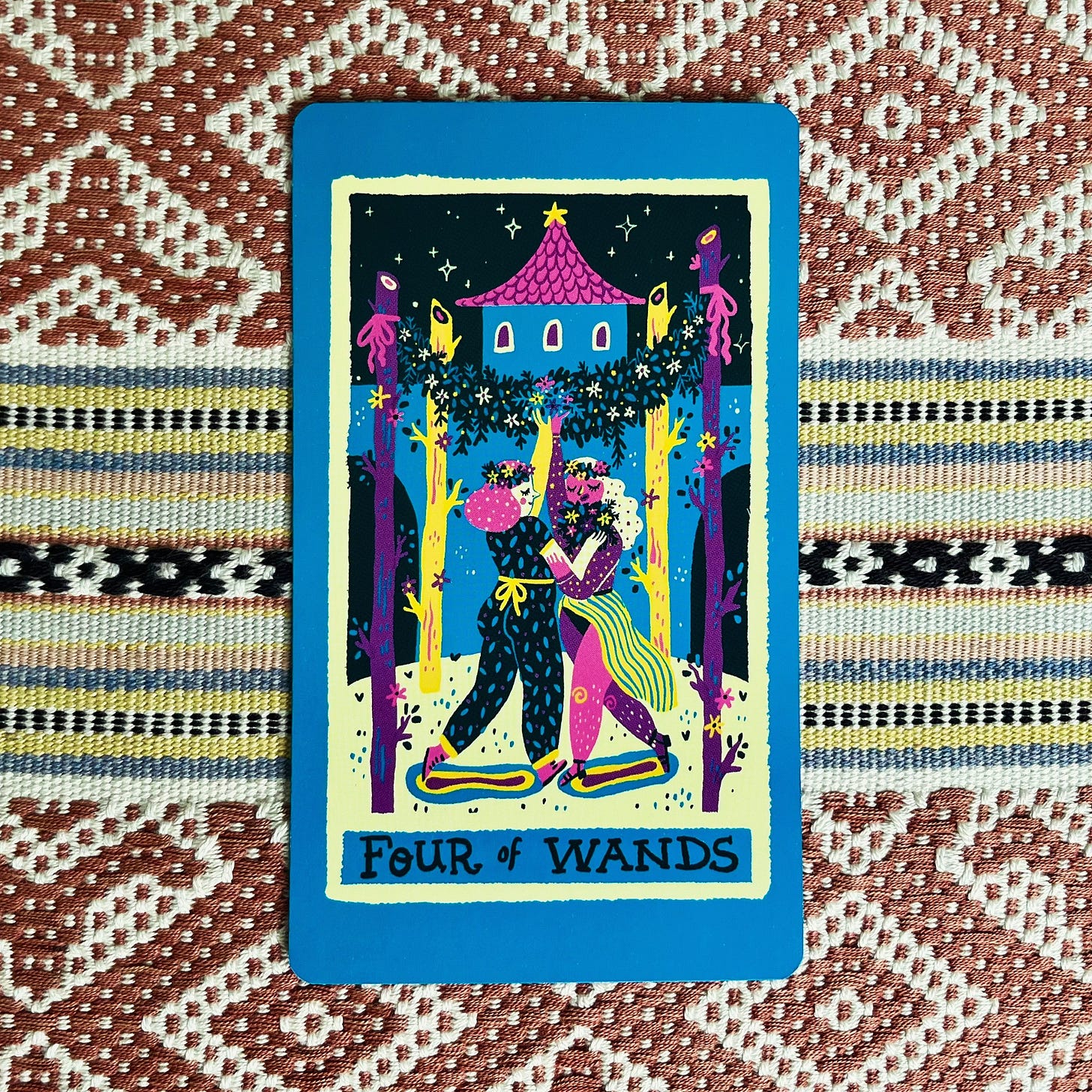What do I want to pay attention to?

I’ve heard many people say this is supposed to be a year of transformation. For me on a personal level this has included work transitions (the end of several multi-year projects, the emergence of my coaching practice), a physical move, and the ongoing process my partner, kiddo, and I are engaged in to understand ourselves anew and redesign our lives to affirm our neurodivergence.
All this transition feels especially present as I’m still in the midst of the move, and not a little overwhelming, so the inquiry question I picked this month is:
What do I want to pay attention to?
And the tarot card I pulled to kick off my reflection was the Four of Wands.
In tarot, fours speak to stability, structure, framing, boundaries, group relations. In Red Tarot: A Decolonial Guide to Divinatory Literacy, Christopher Marmolejo offers a reflection on the Four of Wands that speaks to — among other things — solidarity, belonging, and building community that can honor difference and has the capacity to hold conflict and disagreement:
“The Four of Wands is the struggle of establishing solidarity, the challenge of translating across disparate political imaginations, in a manner that appreciates difference rather than expunging it.”
This makes me think of how important it is in change work that we resist the urge to mask difference (“we have more in common…”) and instead have faith in our ability to forge community and connection not only out of same-ness/shared identity but also out of empathy, curiosity, compassion, and a deep understanding of (and care for) our differences — including our different experiences of power and oppression.
As a person of some “plural” identities — who has roots in and has lived between multiple countries/cultures, who grew up mixed class, who is bisexual — I have a complicated relationship with the idea of belonging. Belonging has too often felt like it requires meeting a murky benchmark or telling just one part of my story, ignoring the parts that don’t fit or choosing to not correct assumptions I know are being made. Yet there have also been times in my life when I’ve been lucky enough to experience the pluralistic community Marmolejo writes about, and even just remembering those periods now I can feel an expansiveness in my chest, a hopefulness.
This also reminds me of something I read in Olivia Araiza, Gerald Lenoir, and Joshua Clark’s paper Organizing, Power Building, and Bridging (part of the Othering & Belonging Institute’s Bridging and Power Building Paper Series) while I was preparing for some recent facilitation work:
“Bridging addresses tensions or ‘breaking’ dynamics and narratives that sustain division in order to develop a new ‘we’ that is not only more inclusive, but cohesive, durable, and consistent with bringing about belonging and greater social justice. The new ‘we’ that results need not agree on everything, or even very much; but its members should have a shared empathy and lasting stake in one another. [...]
To be clear, bridging is not about ‘saming’—that is, subsuming or erasing existing smaller ‘we’ identities as we create a bigger ‘we.’ Bridging creates a space that is larger than the sum of its parts, that honors and affirms the multiple identities that individuals and groups bring to the table.”
Bridging rejects the urge to minimize or mask difference, and moves instead to connect across and through it. And, as Marmolejo notes, courage and meaningful action on each other’s behalf are the tools we use to do this:
“To build community we must also locate the values we share across difference. It is not enough to bond solely on the basis of our skin or any other identity marker. It is who steps up, for whom and for what; it is the demonstration of moral and ethical courage that is the basis of building community and communion.”
As I greet a new home this month in a community where I am starting to build some truly meaningful relationships…
As I’m evolving between old and new understandings of myself, my partner, and my family (what we share in our neurodivergence… and what we don’t)…
And as I watch the polarized rhetoric around the upcoming US election/transition of power and the pressure to fall in line behind the new Democratic candidate…
I want to make sure I’m paying attention to this wisdom about belonging, community, and authentic solidarity — to when we’re choosing to minimize, mask, or bridge, and to the impact of those choices.

